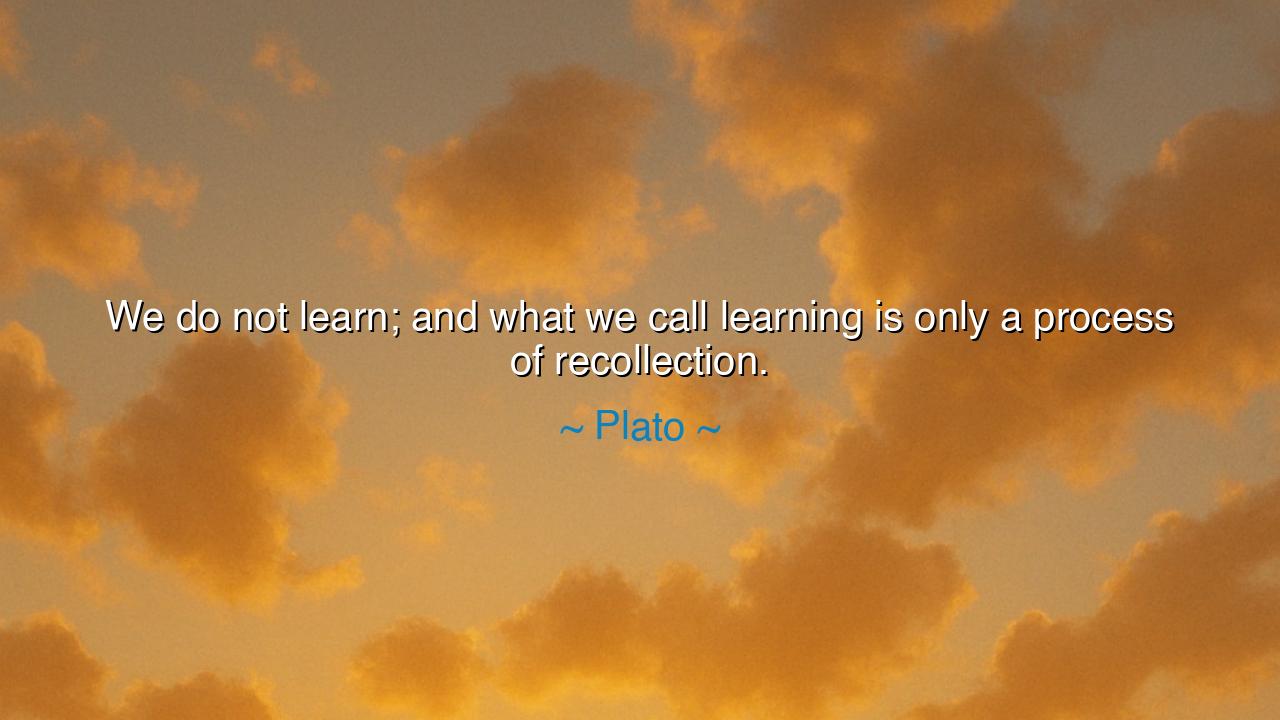
We do not learn; and what we call learning is only a process of






“We do not learn; and what we call learning is only a process of recollection.” – Plato
In these haunting and immortal words, Plato, the philosopher of light and form, speaks not merely of knowledge, but of the soul’s eternal memory. To the ordinary mind, learning seems an act of acquisition — as though truth were something we collect, piece by piece, from the world around us. But to Plato, this is illusion. He reveals a far deeper mystery: that the truths we “learn” are not foreign to us, but already reside within the soul. To learn, therefore, is not to gain, but to remember — to awaken from the long sleep of forgetfulness that shrouds the divine within us.
The origin of this teaching lies in Plato’s dialogue Meno, where the philosopher Socrates demonstrates this principle before his students. He calls forth an uneducated slave boy and, through simple questioning, leads him to discover a complex truth in geometry — a truth the boy had never been taught. Socrates then declares that this is proof that knowledge lies latent within, that the soul remembers what it once knew before birth, in the realm of perfect Forms, where truth, beauty, and goodness dwell in their purest essence. Thus, what we call “learning” is the act of recollection, the reawakening of eternal knowledge through reason and experience.
To the modern mind, this idea may seem strange, even mystical — yet it carries a timeless power. For what is it to learn, if not to recognize something familiar within the new? When you hear a melody for the first time and feel that you have known it all along, when a great truth moves your heart though your mind cannot explain why — are you not remembering? Plato speaks to this sacred resonance between the soul and truth: that the deepest knowledge is not taught, but remembered. Wisdom does not enter from without; it rises from within.
The ancients held this belief not as mere theory, but as a sacred understanding of human destiny. To them, the soul was immortal, descending from a higher realm into the world of matter, where it forgets its divine origins. The journey of life, therefore, is not simply to gather facts, but to reawaken the memory of truth — to polish the mirror of the mind until it reflects again the radiance of the eternal. In this way, the act of learning becomes holy. Every new insight, every moment of wonder, is a fragment of heaven remembered.
Consider the story of Pythagoras, the sage who spoke of the harmony of the spheres. He claimed to recall truths of the universe not through invention, but through remembrance — through contemplation of the patterns that had always been. Or think of Mozart, who, when asked how he composed symphonies so effortlessly, replied that he did not “create” them, but “found” them — as though they already existed in the air, waiting to be rediscovered. In both, we see Plato’s vision alive: that genius is remembrance, that inspiration is memory made conscious.
This teaching bears profound meaning for all who seek wisdom. It tells us that truth is not beyond reach, nor locked away in sacred books or distant stars — it is within us, hidden like a buried seed. Our task is not to chase knowledge as if it were foreign, but to cultivate the silence and attention that allow memory to bloom. Meditation, reflection, deep study — these are the tools of recollection. The teacher’s role is not to fill the mind, but to awaken it. The true master, as Socrates did, asks questions that stir the soul into remembering its own light.
So, my children, do not think of yourselves as empty vessels waiting to be filled. Think instead as travelers rediscovering an ancient homeland. When you study, listen not only with your mind but with your heart, for the truths that stir your heart are the ones your soul has always known. Every act of learning, every spark of recognition, is a moment of remembrance — a return to the eternal wisdom that lives within you.
For as Plato reminds us, we do not learn — we remember. The universe itself is the grand reminder, the echo of our forgotten origins. Look upon the stars, listen to the wind, ponder the order of the world, and you will feel it: the quiet certainty that you have known these things before. Seek not to master truth, but to remember it — and in remembering, you will rediscover yourself. For the path of wisdom is not a journey outward, but a journey home.






AAdministratorAdministrator
Welcome, honored guests. Please leave a comment, we will respond soon